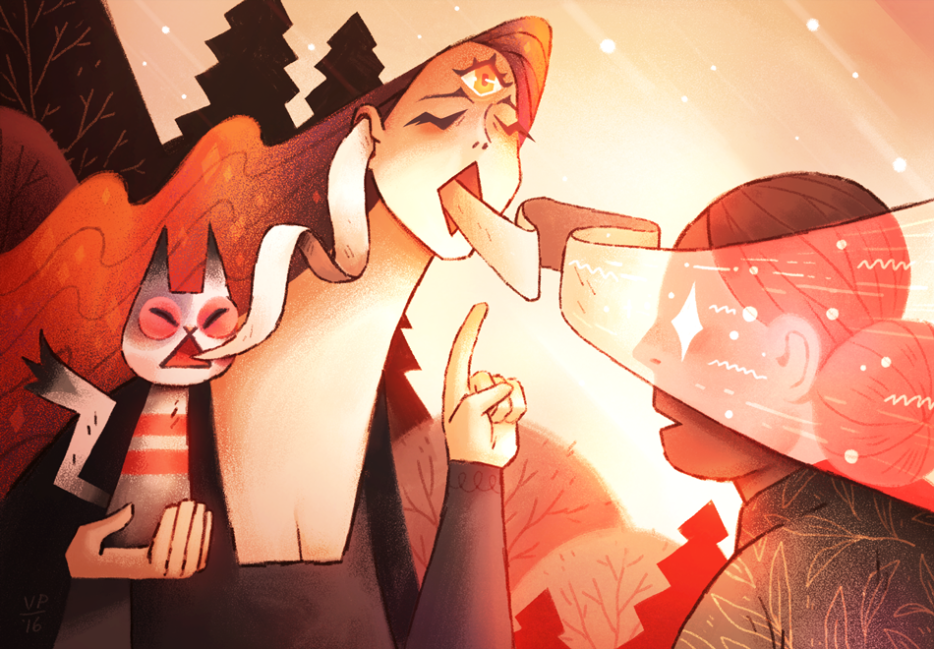Last October, I came back from a month away and my cat wouldn’t speak to me. He refused to come in the house; if he saw me, he ran away. He’d always been a partly outdoor cat with an independent streak, so at first I wasn’t worried. Maybe he hadn’t liked the woman who sublet my house in my absence. Or he was punishing me for going away. Maybe he was just savoring the last weeks of a lingering Texas summer—the slow descent of twilight, the fat mice moving in the grass. But a few days passed, and then a week, and he continued to avoid me. Two weeks after I returned home, I spent an afternoon sitting very still, watching him sunning himself in my neighbor’s backyard. He looked healthy and self-satisfied, in fine feline form. But then he must’ve felt my eyes on him; he stood up and hopped easily over the fence, disappearing back into whatever secret space he was spending his time in.
I enlisted my friends to prowl the neighborhood with me, calling his name—as if he had ever been the kind of animal who came when called. I ventured as far as I dared into the thick brush beside the railroad tracks, trying to lure him with catnip. I bought insanely expensive wet food, organic and grain-free, the kind of cat food that comes garnished with herbs, and set it outside the front door. When that didn’t tempt him, I bought the cheap Dollar General stuff, ambiguous gray globs suspended in jelly. The message I was trying to send was: Whatever you want, buddy, as long as you come home. But he didn’t come home.
My neighbor saw him more than I did—he liked to show up at sunrise to watch her feed her chickens. They had reached a kind of truce, but as soon as I showed up, he’d dash off to one of his hiding places. One morning at the beginning of November the buzzards were gone—supposedly the sign of that the year’s first freeze is coming. That night, the weather turned. The wind sounded like an enemy trying to get into the house, and there was frost on the grass in the morning. My neighbor reassured me that Musa had come by to watch the chickens get fed and didn’t seem any worse for wear. The inaccessibility of his secret life drove me crazy. Where was he sleeping? What was he eating? Did he know he was breaking my heart?
In December, my friend Brandon came over one day to drop off a book; when he asked me how I was, I started crying and I couldn’t stop. I felt foolish, and also so, so sad. “Are you sure this is about the cat?” he asked. I could see his point, but I was pretty sure it was. I called my mom for a pep talk. “Maybe you just have to accept that he wants a different kind of life,” she said. I hung up on her, and didn’t even call back to apologize.
People actually buy books such as How to Speak Cat, which promises to parse the sixteen different kinds of meows your cat is making. In YouTube videos, you can watch otherwise perfectly normal-looking human beings showing off their dogs making garbled noises that are supposed to sound like “I love you.”
Two weeks before Christmas, I was explaining to a friend in town that if I seemed more distressed than usual, it was just because I was trying to accustom myself to the fact that my cat didn’t want to be my cat anymore. “No way,” she said. “Here’s what you do: You just call Dawn.” And then she gave me the cat psychic’s phone number.
*
On the surface, it’s ridiculous to say my cat stopped speaking to me, because, of course, he has never spoken to me—I’m not a shaman, and I don’t live in a Disney cartoon. But people who have pets will know what I mean; when you live with animals, you’re engaged in constant, low-level communication with them.
The incredible amount of intimacy we share with our non-human companions means we become familiar with their expressions and body language, learn how to decode their yips and mews. And yet our lack of a common, spoken language means there’s always a gulf of understanding between us. Perhaps that’s why talking to animals is such a persistent fantasy: Ancient Greeks told stories about Orpheus’s ability to mystically, musically commune with beasts; two thousand years later, children read about Dr. Doolittle’s genteel chats with a crocodile. People actually buy books such as How to Speak Cat, which promises to parse the sixteen different kinds of meows your cat is making. In YouTube videos, you can watch otherwise perfectly normal-looking human beings showing off their dogs making garbled noises that are supposed to sound like “I love you.”
Our desire to talk to our pets is so strong that we’re willing to forgive a lot of nonsense. The guy who wrote How to Speak Cat has pretty much admitted that the sixteen meows theory is made up. Most of us who live with animals have been guilty at one time or another of that particular flavor of solipsism that involves projecting our own human thoughts and feelings onto the animals we live with. (I once dated a guy who told me the key to understanding his mom was to take every sentence where she talked about what the dog was thinking/feeling and replace his name with her own: Daisy is so excited to meet you! Daisy is tired. Daisy gets over-excited when there are too many people in the house.)
Hence the moral objection to anthropomorphism: “To imagine that animals think like humans or to cast animals in human roles is a form of self-centered narcissism: one looks outward to the world and sees only one’s own reflection mirrored therein,” write Lorraine Daston and Gregg Mitman in Thinking with Animals: New Perspectives on Anthropomorphism. Anthropomorphism can also reflect a lack of imagination: “To assimilate the behavior of a herd of elephants to, say, that of a large, middle-class, American family or to dress up a pet terrier in a tutu strikes these critics as a kind of species provincialism, an almost pathological failure to register the wondrous variety of the natural world—a provincialism comparable to that of those blinkered tourists who assume that the natives of the foreign countries they visit will have the same customs and speak the same language as at home.”
*
When I looked her up online, Dawn proved to be much more than just a cat psychic. Her website included photographs of all kind of animals, from horses to small rodents. There were also links to her children’s books about a giant rabbit; according to her bio, she enjoyed fabric art, rollerblading, and spending time with animals.
On her website, Dawn was careful to denote where her abilities began and ended. She could communicate directly with animals via telepathy, helping her clients to “learn how [their animals] are feeling, what they need, and who they really are.” Initial phone consultations lasted forty minutes—“perfect for getting to know everything you have wondered about one animal friend”—and cost $65. I am not by nature a person who believes in psychics, although I’ve often wished I were. Compared to my friends who text with their shamans and go on desert vision quests, I’ve always felt boringly earth-bound, unreceptive to miracles. I had consulted a psychic once before, when I was twenty. She said I was an old soul, but it didn’t mean much to me; I had the feeling she told everyone that. But I was desperate, and therefore receptive. I reserved the next available slot.
Dawn called me at 11 a.m. on a Tuesday morning. I explained the situation to her, tripping over my words, worried she was such a good psychic she’d be able to tell I didn’t believe in psychics, much less psychics who talk to cats, and muchmuch less psychics who talk to cats over the phone from two thousand miles away. I told her the whole story: the month away, the subletter, Musa’s persistent cold shoulder. “Hmm,” she said, as if I had presented her with a particularly tricky puzzle. “Well, that is a tough one, isn’t it?” Dawn’s voice was patient but firm; it was easy to imagine her saying soothing words to a panicked animal. She asked if I knew what and where Musa was eating, and if there had been any other significant changes around the house. “My mom says that maybe he just doesn’t want to be my cat anymore,” I said. “No, of course not,” she said. “These things just take time, is all.” She sounded confident, optimistic. I realized that the animal she was calming down was me.
“Now I’m going to be quiet for a while, because I’m speaking with Musa,” Dawn told me. “But if you don’t hear anything from me after ten minutes, then we probably got disconnected, and you should call me back.”
It felt strangely intimate to be silent on the phone with a stranger. I wondered whether there was some sort of psychic facilitation I should be working on, or whether my attempts to do so would just clutter up the connection. Instead, I closed my eyes and started counting my breaths. After I reached seventeen, Dawn spoke again. “Well, he’s a sweet one, isn’t he? He says he loves you very much,” she said. I might have started crying a little bit; so what if that line is probably the pet psychic’s version of telling someone they’re an old soul? I believed it, or I needed to believe it, or maybe there wasn’t much difference between the two at that point.
I kept trying to think up questions to keep Dawn on the line. I wasn’t quite ready to let her go. Our forty-minute conversation had been like one of those particularly intense therapy sessions where you walk out the door with an exhausted, cleaned-out feeling, like your heart has just been power-washed.
Dawn reported that Musa had been freaked out by my departure and the subletter’s arrival; even though he knew I’d been back for months, he was still stuck in a bit of a trauma loop, which was triggering his anxiety every time he saw me. He was healthy enough—he told her that one of my neighbors had been feeding him—but he was not at his best. She told me freedom was incredibly important to him, and if he came inside, even if it was just for a second, I had to let him go back out as soon as he asked. She told me that she had gently encouraged him to come home, where it was warm and the food was plentiful.
Our time was up, but I kept trying to think up questions to keep Dawn on the line. I wasn’t quite ready to let her go. Our forty-minute conversation had been like one of those particularly intense therapy sessions where you walk out the door with an exhausted, cleaned-out feeling, like your heart has just been power-washed.
You’re going to think I’m making this up, but I swear this is what happened: Two days after I talked to Dawn, I was working in my office when I heard a meow. Musa was standing outside, looking expectant, even a little annoyed. I opened the door and let him in, trying not to make any sudden moves. He padded into the house nonchalantly, brushing against me as if he hadn’t spent the past two months avoiding any kind of contact. Then he seemed to reconsider, and turned to walk back outside. I left the door open for him. A couple minutes later, he came back in and went right over to his food bowl. I listened to him crunch away on his kibble, a sound I hadn’t even realized I’d missed. His presence in the house felt like a minor miracle, one of those small wonders credited to lesser-known saints.
That was at the end of December; from that day since, we’ve picked up where we left off. Musa sleeps on my bed, curled into himself like a Junebug. In the morning he complains until I let him outside; he still likes to go watch the chickens get fed. When the evenings are warm, I’ll sit on the porch and drink a beer while Musa keeps an eye on the birds.
*
About a hundred years ago, a German math teacher and mystic named Wilhelm von Osten owned a horse named Clever Hans. Over a period of years, von Osten said, he had patiently given Hans the equivalent of a kindergarten education, including instruction in simple arithmetic. The conversation was two-way; Hans communicated via a kind of hoof language, tapping the ground a specific number of times to indicate a particular number or letter. Fans flocked to von Osten’s home in the outskirts of Berlin to see the horse in person; Clever Hans performed before dukes and doctors. Nearly everyone was won over: Von Osten would ask his horse how many ladies were standing in line to see him, and he’d lift his hoof and tap out the correct number. Hans appeared to be able distinguish between gold, silver, and copper. He knew the days of the week and what month it was. He performed simple arithmetic operations and could tell time using a watch. “The versatility of Hans in other directions is astonishing. He can distinguish between straw and felt hats, between canes and umbrellas. He knows the different colors,” the New York Times reported in 1904.
But not everyone was convinced. In 1907, a group of experts—including psychologists, zoologists, and a circus trainer—known as the Hans Commission devised a series of experiments to try to get to the bottom of Clever Hans’s remarkable abilities. They tried putting blinders on the animal, and having someone other than von Osten feed the questions to Clever Hans. Ultimately, the commission determined that there was no such trickery going on with von Osten—but also that the horse wasn’t able to understand human language, or at least not in the way von Osten claimed. Instead, he was so tuned in to his handler’s body language that he was able to pick up on subtle cues—cues that von Osten didn’t even know he was delivering:
The state required for a successful response was not the mere passive expectation that the horse would tap the number demanded of him nor the wish that he might tap it, but rather the determination that he should do it. An inward "Thou shalt", as it were, was spoken to the horse. This affective state was registered in consciousness in terms of sensation of tension in the musculature of the head and neck, by intraorganic sensations, and finally by a steadily rising feeling of unpleasantness. When the final number was reached, the tension would suddenly be released, and a curious feeling of relaxation would ensue.
The public debunking didn’t deter Clever Hans’s fans, who still flocked to see him. Von Osten was never fully convinced his horse didn’t understand him—perhaps because the two were communicating in a remarkably attuned way, even if the terms of that conversation weren’t what von Osten thought they were.
There are, of course, non-metaphysical explanations for why my cat came back. My father, a stone-cold materialist, believes Musa picked up on the fact that the cat psychic had calmed me down. Some subtle message in my body language must have told him I’d made up my mind to allow him his freedom. In the end, the mechanism of it doesn’t matter much to me; whether the credit goes to telepathy or body language or simple luck, I don’t see Musa’s return as any less of a miracle.
“The word love can be found in neither the index of The Oxford Companion to Animal Behavior nor the Encyclopedia of Animal Behavior,” animal behaviorist Jonathan Balcombe writes in Exultant Ark: A Pictorial Tour of Animal Pleasure—in part, he theorizes, because “it is difficult, if not impossible, to prove feelings of love in another individual, even a human. This is the challenge of private experiences.”
When you’re close to someone—cat or human or whoever else—it can be easy to take them for granted, at least until they do a thing that makes you look at them in wonder: Oh! You are a separate creature with a separate mind! And a chasm opens up between you. Balcombe’s “challenge of private experiences” seems to me like a polite phrase for the queasy feeling of peering down into that unbridgeable gulf that exists between all minds. Even so, we keep folding our messages into paper airplanes and trying to fling them across the gap. Some of them, I think, make it over. “The longing to think with animals” isn’t always solipsistic, write Daston and Mitman in Thinking With Animals. At times, it can even be quite the opposite—“a virtuoso but doomed act of complete empathy.” The distance is always there, and we’re always reaching across it, in whatever ways we can.






